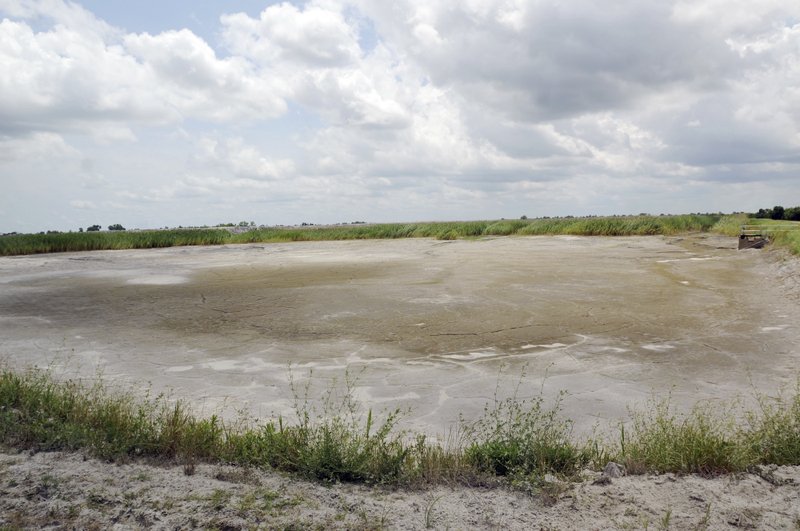The state of North Carolina says it has secured an agreement with Duke Energy to excavate nearly 80 million tons of coal ash at six facilities.
The Department of Environmental Quality said in a Thursday press release that it will be the largest coal ash cleanup in the nation’s history. It also settles various legal disputes between Duke and parties that include environmental and community groups.
For decades, coal ash has been stored in landfills or in ponds, often near waterways into which toxins can leach.
Duke Energy will remove coal ash from the Allen, Belews Creek, Cliffside, Marshall, Mayo and Roxboro sites into on-site lined landfills.
“This agreement is a historic cleanup of coal ash pollution in North Carolina, and the Department of Environmental Quality and community groups throughout the state have provided essential leadership in obtaining it,” said Southern Environmental Law Center senior attorney Frank Holleman in a written statement.
Stephen De May, North Carolina president of Duke Energy, said in a statement that the agreement “significantly reduces the cost to close our coal ash basins in the Carolinas for our customers, while delivering the same environmental benefits as full excavation.”
The issue of coal ash storage drew national attention following a spill in Tennessee in 2008. Cleanup became a priority in North Carolina after a 2014 leak from a Duke Energy site left coal ash coating 70 miles of the Dan River on the state’s border with Virginia.
Duke Energy pleaded guilty in 2015 to federal environmental crimes after an investigation found the company allowed coal ash dumps at five power plants to leak toxic waste into water supplies. The company agreed to pay $102 million in fines and restitution.
In 2018, Duke Energy agreed to pay a $156,000 penalty for similar state environmental violations at three other power plants after pollution entered groundwater and the adjoining Catawba and Broad rivers.
In April 2019, North Carolina ordered the energy company to excavate all coal ash deposits from its power plant sites. Duke Energy went on to contest the ruling, saying the state’s Department of Environmental Equality exceeded its authority.
One method of removing and storing coal ash has been partnership with counties to find spots deep in the ground for the ash. Duke Energy agreed to deals with Chatham and Lee Counties in 2015 to move coal ash into mines.
In Chapel Hill, coal ash has been a point of conversation because of a different deposit near the town’s police station and Bolin Creek. The town has been providing updates on the remediation of the land on its website.
Related Stories
‹

Damage from Tropical Storm Debby Leads to Power Outages in Orange, Durham and Chatham CountiesAs the storm moved through North Carolina on Thursday, several communities in Orange, Chatham and Durham Counties reported losing power.

Adverse Weather Leads to Flood Warning, Power Outages in Orange and Chatham CountiesThe string of storms moving across the southeast caused some adverse conditions in the Triangle, with Chapel Hill, Carrboro and Durham among the areas issued alerts from the National Weather Service. A flash flood warning was in effect for several hours on Friday in the towns, as rain caused rapid rises in creeks and streams. […]

Tourism Spending Increases for Orange, Chatham Counties After 2020 LowsNorth Carolina recently received its annual tourism report. Locally, Chatham and Orange counties experienced healthy rebounds in revenue.

Duke Energy Building Coal Ash Recycling Plant in MoncureBy Casey Mann, Chatham News + Record Staff Duke Energy is constructing a coal ash recycling unit on the property of its former Cape Fear plant in Moncure with the goal of excavating the coal ash in basins there, helping it meet the state-mandated basin closure deadline and providing another use for the discarded ash. The […]
![]()
State Local Officials Push for Solar Power Partnership with Duke EnergyCEO of Duke Energy seeking a partnership to install solar power and energy storage systems at North Carolina schools. Officials from school systems, counties and cities across the state are urging the energy company to provide schools with solar and storage infrastructure, which they have […]
![]()
Duke Energy Sued for 2014 Coal Ash Spill Environmental HarmThe federal, North Carolina and Virginia governments asked a court Thursday to declare the country’s largest electricity company liable for environmental damage from a leak five years ago that left miles of a river shared by the two states coated in hazardous coal ash. Government lawyers sought to have Charlotte-based Duke Energy declared responsible for […]
![]()
N Carolina, Duke Energy Contest Coal Ash Cost, Removal ScopeNorth Carolina’s environmental agency exceeded its authority by ordering Duke Energy Corp. to dig up all of its coal ash and move it from unlined storage sites where toxic chemicals have seeped into water supplies, the country’s largest electric company said Friday. Duke Energy said an administrative challenge to the state Department of Environmental Quality […]
![]()
Duke Energy to Contest N Carolina Coal Ash Excavation OrderThe country’s largest electric company says it’s challenging an order by North Carolina’s environmental agency to excavate coal ash from all of its power plant sites in the state. Duke Energy Corp. said Thursday it will file an administrative appeal by May 1. The order could cut the risk of toxic chemicals leaking into water […]

Tests: Few Heavy Metals in River After Coal Plant Dam BurstDespite the gray muck that fouled the Cape Fear River near a Wilmington power plant after Hurricane Florence, water tests so far show heavy metals contained in coal ash are within state standards, North Carolina environmental officials said Thursday. Water quality samples collected over four dates within two weeks of Florence crashing ashore a few […]
![]()
Attorney General Challenges Regulators Over Coal Ash ChargesNorth Carolina’s attorney general on Wednesday challenged regulators for allowing Duke Energy to start charging consumers hundreds of millions of dollars to clean up coal ash dumps and add a potential profit margin. State Attorney General Josh Stein’s office said in a filing to the North Carolina Utilities Commission he considers its decision to pass […]
›






